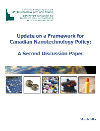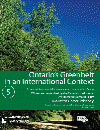|
Summer 2008 Newsletter
What's New in this Issue?
CIELAP Successes
Government News
Environment in the Media
CIELAP Events
Please Donate to CIELAP: CIELAP is an independent, charitable environmental policy think-tank. Your donation will help us continue our policy analysis and bring our recommendations to policy makers.
CIELAP Successes - New CIELAP Publications
Conflicts, costs and environmental degradation – impacts of antiquated ground water allocation policies in the Great Lakes Basin
CIELAP's paper, authored by Timothy J. Morris, Satya P. Mohapatra and Anne Mitchell, has just been published in Water Policy, a peer reviewed journal. Access the paper's abstract.
An overview of policies for managing polybrominated diphenyl ethers (PBDEs) in the Great Lakes basin
This paper was published by Environment International, a peer reviewed journal, and authored by CIELAP researchers Jessica Ward, Satya P. Mohapatra, and Anne Mitchell. It reviews the current regulations and policies for managing PBDEs in the Great Lakes jurisdictions and briefly reviews commercially available non-bromine chemical alternatives to PBDE. Access the paper's abstract.
Update on a Framework for Canadian Nanotechnology Policy: A Second Discussion Paper (May 2008)
 CIELAP's report reviews some of the recent developments in nanotechnology and discusses some strategic priorities for attempting to manage this technology in a responsible manner. The paper concludes with a proposed timetable for implementing seven of CIELAP’s recommended actions. Download the full CIELAP report.CIELAP’s Backgrounder also provides some basic information about Nanotechnology. CIELAP's report reviews some of the recent developments in nanotechnology and discusses some strategic priorities for attempting to manage this technology in a responsible manner. The paper concludes with a proposed timetable for implementing seven of CIELAP’s recommended actions. Download the full CIELAP report.CIELAP’s Backgrounder also provides some basic information about Nanotechnology.
Ontario’s Greenbelt in an International Context: Comparing Ontario’s Greenbelt to its Counterparts in Europe and North America (April 2008)
 CIELAP’s report explores the lessons learned from five other greenbelts in Europe and North America and makes recommendations for how to sustain a viable and healthy greenbelt in Ontario that can withstand inevitable development pressures.
Download the full CIELAP report. CIELAP’s report explores the lessons learned from five other greenbelts in Europe and North America and makes recommendations for how to sustain a viable and healthy greenbelt in Ontario that can withstand inevitable development pressures.
Download the full CIELAP report.
Government News
Labeling of Genetically Modified Organisms
In a 2004 report on GMOs the Canadian Biotechnology Advisory Committee (CBAC), an advisory group to the Federal Government that is now disbanded, indicated that a voluntary labeling policy on GMOs should be put in place for five years and, if that policy did not work, mandatory labeling should be considered. Almost five years later there is no evidence that the voluntary labeling policy has worked. On May 7, Bill C517, a Private Member’s bilI on mandatory labeling was defeated by 156 to 101 at second reading. You can find out how your MP voted by consulting Hansard.
CIELAP feels that this debate should continue. We are seeking funding to build on previous recommendations that we’ve made with respect to labeling by examining the systemic barriers to labeling that have been faced in Canada on key issues of consumer health and right-to-know including biotechnology, nanotechnology, personal care products, and local food. Please contact us if you would like more information or to support this work.
The National Pollutant Release Inventory (NPRI)
The NPRI is a federal program that requires specified industrial facilities to annually report on many of the contaminants that they release into the environment. This program is currently being reviewed by Environment Canada. CIELAP is a member of the NPRI multi-stakeholder working group, which meets twice a year to consider changes and improvements to the NPRI. CIELAP hopes that the results of this review will not weaken Environment Canada’s commitment to ensure that the NPRI data continues to be accessible to the general public. Canadians should continue to be able to access information about what facilities are releasing contaminants in their communities. Access the NPRI data using the NPRI Data Search or using pollutionwatch.org to learn about this important resource.
Stewardship Ontario
In February 2008, the Ontario Government approved Stewardship Ontario’s Municipal Hazardous or Special Waste (MHSW) Program Plan, to be implemented on July 1st, 2008. Phase One of the Plan obligates brand owners and first importers of specific materials, including paint, single use batteries, and antifreeze, to report the quantities supplied into the Ontario market and to pay fees on these supplies. In addition, the Plan calls for industry to conduct public education campaigns encouraging citizens to recycle, reuse and reduce MHSW. Phase Two of the Plan will introduce a broader range of products and materials. Visit Stewardship Ontario's website for more information.
CIELAP comments on Canada’s proposed Food and Consumer Safety Action Plan
CIELAP Executive Director Anne Mitchell’s comments on the proposal Food and Consumer Safety Action Plan pointed to concerns that CIELAP raised in its 2006 report There is No “Away” on pharmaceuticals, personal care products, and endocrine-disrupting substances detected in water. The Government of Canada's current proposal to strengthen and modernize Canada’s safety system for food, health and consumer products fails to mention improved standards for reducing and monitoring the use of chemicals and active ingredients in pharmaceuticals and personal care products. Download Anne’s Comments.
Legislative Amendments to the Pesticides Act to ban the use and sale of pesticides for cosmetic purposes (Bill 64, Ontario)
On June 18, 2008, Ontario passed the Cosmetic Pesticide Ban Act, which will ban the sale and cosmetic use of pesticides. The ban, which would likely take effect next spring, prohibits the use of pesticides except those used for farming or forestry. Golf courses, however, will still be allowed to use pesticides but are regulated with specific conditions to minimize negative environmental impacts.
CIELAP's
comments on the Legislative Amendments stated that while CIELAP supports, in principle, province-wide legislation banning the use of cosmetic pesticides and commends the Ministry of the Environment for initiating the proposed legislation, it remains concerned about the lack of application towards golf courses and the Bill's negative effects on current municipal pesticide by-laws. Bill 64 would replace and make inoperative numerous municipal by-laws across the province.
Postings on the Ontario Environmental Registry
Regional Transportation Plan for the Greater Toronto and Hamilton Area (GTHA) – White Paper 1: Vision, Goals and Objectives, and White Paper 2: Preliminary Directions and Concepts (EBR Registry #010-3430). Comments will be accepted until July 8, 2008.
Lake Simcoe Protection Act (EBR Registry # 010-3753) – The Ministry of the Environment is seeking comments on a proposed new law that would provide the tools necessary to protect and restore the ecological health of the Lake Simcoe watershed, and provide a framework for the development of a Lake Simcoe Protection Plan. Comments will be accepted until August 16, 2008.
Environment in the Media
Incineration
On Wednesday June 18, 2008 a three-judge panel of the Ontario Divisional Court, in a precedent-setting decision, rejected Lafarge Canada Inc.’s attempt to overturn a comprehensive public hearing that would require Lafarge to justify its plan to use meat and bone meal, tires and pelletized municipal garbage as fuel at a cement plant in Bath, Ont. Read more about this story in the Globe and Mail or download CIELAP’s March 2007 paper Ontario’s Waste Management Challenge – Is Incineration an Option? to learn more about waste incineration in Ontario.
Nanotechnology
On May 21, 2008 the Globe and Mail published an
article entitled "Strict guidelines urged for nanomaterials". The article highlighted CIELAP's release of an Update on a Framework for Canadian Nanotechnology Policy: A Second Discussion Paper and Media Release addressing CIELAP's recommendations to ban nanomaterials in foods and impose mandatory labelling of the materials in cosmetics, personal-care products and cleaning agents.
Ontario Greenbelt
CIELAP research was also the subject of an article in the Globe and Mail on April 10, 2008. The
article, entitled "Ontario's greenbelt a model for the world" reported on the findings of CIELAP's report Ontario’s Greenbelt in an International Context.
CIELAP Events
Throughout the last week in May The National Film Board of Canada’s Mediatheque in downtown Toronto hosted a special edition of its free monthly Green Screens environmental screening and discussion series.
The series began on May 26 with Post-Screening Panel that included Dr. Stephen Scharper and Dr. Mary Alton Mackey followed by the Toronto premiere of the documentary The World According to Monsanto. Other documentaries such as Up the Yangtze, Refugees of the Blue Planet, Weather Report and Toxic Trespass were shown throughout the week. Visit the Green Screens website to learn more about this event.
To subscribe or unsubscribe send an email to cielap@cielap.org
|